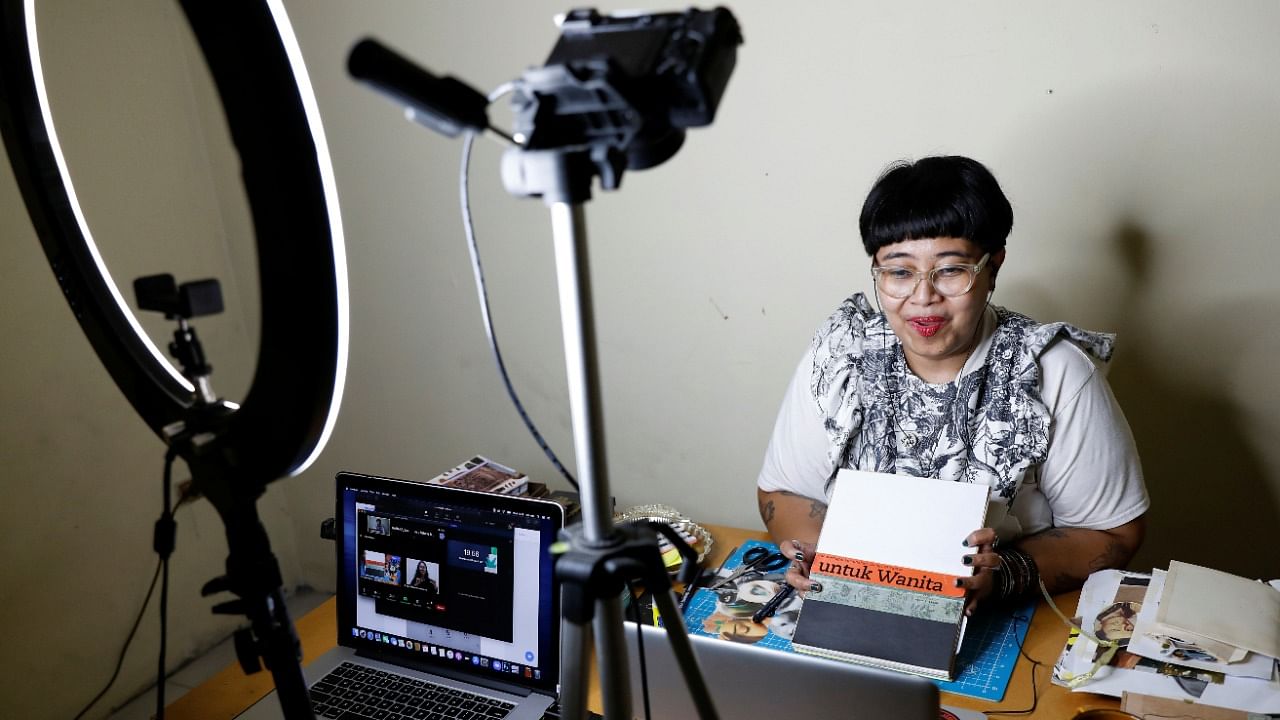
Hussy, mistress, whore, evil woman — these are just some of the nine example compound words that artist Ika Vantianti was shocked to find listed under the entry for 'woman' or 'perempuan' in Indonesia's official dictionary.
All nine were sexualised or derogatory terms. In contrast, in the entry for 'laki-laki', one of the words for man, there is just one example, 'laki-laki jemputan', which means a 'man chosen as a son-in-law'. Another word for man, 'pria' also lists one term: 'pria idaman' meaning 'heartthrob'.
Since making this discovery in 2016, Ika has campaigned through her art for change and as part of that, she has assiduously collected editions of the Kamus Besar Bahasa Indonesia, which is compiled by a government agency and is the standard dictionary used in schools and by teachers.
"Perempuan jalang, this one actually means slut. That is the one word that keeps popping up in every edition," she told Reuters.
"The focus is on examples that include words like pelacur or jalang — meaning whore, a woman who loves to sell herself, nasty women, mistress."
Last November, the Oxford University Press said it would change the entries for 'woman' in its dictionaries to include more positive and active descriptions and Ika is hoping for a similar result.
The campaign has drawn attention to what critics say is a patriarchal culture in the world's biggest Muslim majority country. Ika has also gained the support of Indonesia's National Commission on Violence against Women which this year called for a revision.
Language, the commission said, "played an important role in building the values of gender equality and the elimination of violence against women".
Ika and her male colleague, Yolando Zelkeos Siahaya, have highlighted the issue in a series of workshops and exhibitions, including one at the Indonesian national gallery in 2018.
One work featured clear sheets of acrylic with the dictionary entry for 'perempuan' printed across them so that viewers could imagine being referred to in that way.
"Most people when they see this work of mine, they are shocked," said Ika. "They say: 'I never would have thought that is how the word 'woman' is defined in our dictionary.'"
Last month her work, which include t-shirts that call for change to the entry and were worn at a women’s march in 2020, provoked a response from Badan Bahasa, the agency responsible for the dictionary.
The use of the terms, it said, was based on data showing they were among the most frequently used in tandem with 'perempuan'.
"As for the social picture that emerges from the presentation of information in the dictionary not being ideal, that is another discussion," it said in a statement posted on its website.
The response perplexes University of Indonesia linguist Nazarudin, who says Indonesian language data from 2013 collected by Leipzig University shows other phrases, such as women's empowerment or women's rights, were far more frequently used.
"The question is, what kind of data did they have?" he asked, "How can it be so negative?"
A Google search shows there are 98 million entries for 'hak perempuan' meaning women's rights compared to just 481,000 entries for perempuan jalang, the word for 'slut'.
Badan Bahasa told Reuters that in addition to the Leipzig data, it also referred to the Malay Concordance Project, a corpus of classical Malay texts.
Ika says she is hopeful of change.
"I am not saying I want it all to be changed into positive words," she said, "No. But I want objectivity and real conversations."